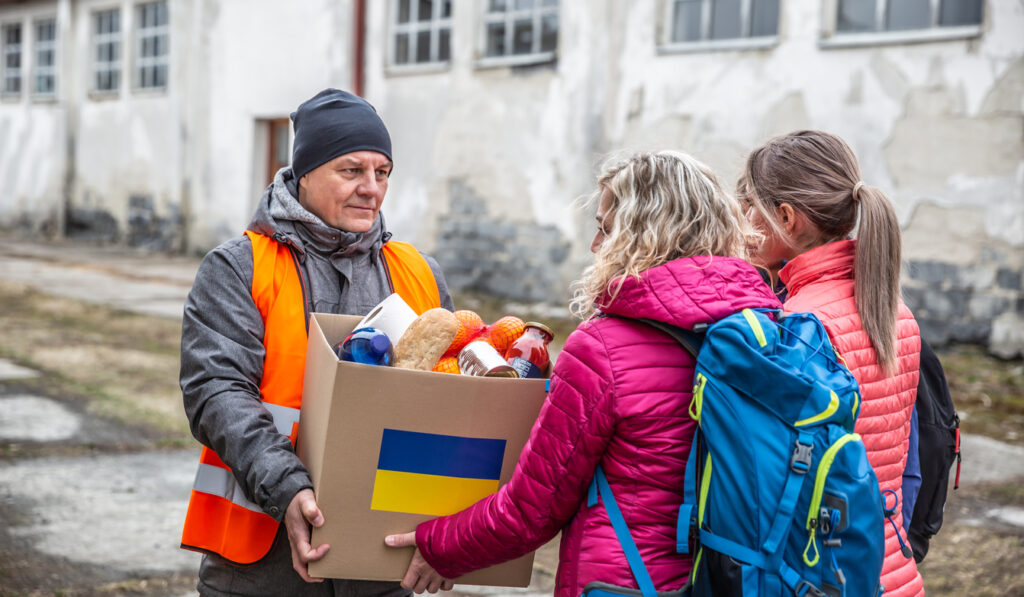From NCTE’s Standing Committee on Global Citizenship
This post was written by NCTE member Cynthia Ryman, who is also a member of the Standing Committee on Global Citizenship.
Everyone knows the word “war.” But very few people understand what it truly means.
Yeva Skalietska, 12-year-old Ukrainian refugee
One of the charges of NCTE’s Standing Committee on Global Citizenship is to encourage the integration of global and international literature and strategies for intercultural understanding within schools. For me as a member of this committee, the war in Ukraine has weighed heavily on my mind. Much of my research focuses on cosmopolitan literacy practices. Through a cosmopolitan approach to literacy, we open ourselves to listening and learning from the experiences of others, we expand our connection to the world, and we engage in humanizing pedagogy.
A cosmopolitan approach to literacy provides the groundwork for a conscious recognition that each person plays a role in creating a better society and world. Each societal and global issue is seen through an empathetic and ethical lens as an issue that is interconnected to one’s own life and survival. Living in the United States, it can be easy to forget the conflict that has impacted the lives of more than five million Ukrainian children (Jervis, 2023). However, I would like to encourage a cosmopolitan literacy approach as an ethical response in critically engaging students to contemplate the experiences of Ukrainian families and children and what it means to stand in solidarity with those facing oppression worldwide. In a cosmopolitan approach, students become adept at investigating issues and understanding varying perspectives. They are encouraged to recognize their capacity to take ethical action to contribute to the future of their world. As Hayden (2012) states,
Cosmopolitan teachers recognize the importance of helping students to remain open, inquisitive, and engaged with others so that they can participate in the ongoing project of their lives. This includes helping students learn how to make sense of the world and their place in it, among others who are attempting to make sense of the world and find their places in it. (p. 247)
To open cosmopolitan awareness and discussion in the classroom, I would like to recommend two books and a resource website to aid students in understanding the impact of this war on the lives of Ukrainian children and families. By making connections, we help our students begin to humanize “the other” as they “recognize themselves as interrelated beings affiliated not just to the territorial space of nation and community but also to the human race as a whole” (Choo, 2013, p. 135).
Recommendations
- You Don’t Know What War Is: The Diary of a Young Girl from Ukraine written by Yeva Skalietska (2022). The opening quote for this blog post comes from Yeva’s diary, which begins two days before the start of the war. She writes in detail about her fears during the first few weeks of the war. She and her grandmother are quickly displaced from their apartment home in Kharkiv, a city bordering Russia. Her diary documents her emotions, her journey across Ukraine into Hungary, and her eventual resettling as a war refugee in Ireland. Through reading this short diary, students have the opportunity to see the war through Yeva’s eyes and better understand what war means.
- War by José Jorge Letria and André Letria (2021). This picture book, originally published in Portugal in 2018, provides a deeply moving and philosophical perspective portraying the darkness, despair, and tyranny of war. The images alone in this picture book will inspire conversation. The book helps provide insight into why war begins and the consequences of war. The dust jacket includes a quote from Deborah Ellis, author of The Breadwinner (2009), stating, “If children are old enough to be bombed, they are old enough to read about it.”
- Colorín Colorado. To provide a broader context of understanding, I highly recommend the resource page created by Colorín Colorado, where you will find primary sources, lesson plans, and guidance on discussing issues related to the war.
In a cosmopolitan approach to literacy instruction, the focus is on actively and empathetically considering one’s responsibility to those who face oppression, both locally and globally. As Hansen (2011) points out, cosmopolitanism requires thoughtfulness in listening to others and “a spirit of openness to learning from the contacts of life, especially those that are new and which, for that reason, can seem odd, unsettling, disquieting, perhaps even frightening” (p. 103).
References
Choo, S. S. (2013). Reading the World, the Globe, and the Cosmos. Peter Lang.
Colorín Colorado. (2022). The invasion of Ukraine: Resources for educators and families. https://www.colorincolorado.org/article/invasion-ukraine-resources-educators-and-families.
Ellis, D. (2009). The Breadwinner. Groundwood Books.
Hansen, D. (2011). The teacher and the world: A study of cosmopolitanism as education. Routledge.
Hayden, M. J. (2012). Arendt and cosmopolitanism: The human conditions of cosmopolitan teacher education. Ethics & Global Politics, 5(4), 239–258.
Jervis, R. (2023, February 22). “We will never be the same”: Displaced Ukrainian children risk erosion in school, mental health. USA Today. https://www.usatoday.com/story/news/world/2023/02/22/ukrainian-children-displaced-war-struggle-school-mental-health-study/11281115002/
Letria, J. J. (2021) War (A. Letria, Illus.; E. Amado, Trans.). Greystone Books.
Skalietska, Y. (2022). You don’t know what war is: The diary of a young girl from Ukraine. Union Square.

Cynthia Ryman teaches at California State University, Monterey Bay. Her research focuses on the impact of literacy approaches that invite cosmopolitan dispositions and the critical content analysis of children’s literature. She is a member of the NCTE Standing Committee on Global Citizenship. She also serves as a board member of Worlds of Words: Center for Global Literacies and Literatures.
The Standing Committee on Global Citizenship works to identify and address issues of broad concern to NCTE members interested in promoting global citizenship and connections across global contexts within the council and within members’ teaching contexts.
It is the policy of NCTE in all publications, including the Literacy & NCTE blog, to provide a forum for the open discussion of ideas concerning the content and the teaching of English and the language arts. Publicity accorded to any particular point of view does not imply endorsement by the Executive Committee, the Board of Directors, the staff, or the membership at large, except in announcements of policy, where such endorsement is clearly specified.

